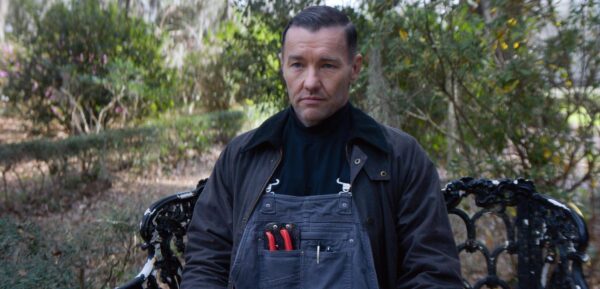Master Gardener premiered in September 2022 at the Venice Film Festival, where writer-director Paul Schrader, 76, received the Golden Lion for Lifetime Achievement. The movie opened theatrically in the US on May 19 and is playing in Los Angeles at the Monica Laemmle. Watch trailer.

Joel Edgerton plays the horticulturist of Gracewood Gardens in Louisiana, employed by a wealthy patron (Sigourney Weaver), who asks him to take in as an apprentice her great-niece (Quintessa Swindell), who is mixed race and addicted to drugs. As the plot unfolds, we discover that this mild-mannered man has a dark past, as a hired killer for white supremacists, and his body is covered with swastika tattooes. He keeps a handwritten dairy detailing his thoughts.
Schrader said: “I don’t know whether this story is even possible, that you can be a white nationalist and be forgiven by a black girl in a garden, but it’s a very interesting fantasy, and that’s what we do in art. You have the metaphor of the gardener, then the larger social stew, whether that be climate change, urban violence, torture, or in this case race.”
The director reflected that his latest movie could be considered the third of a trilogy with The Card Counter (2021) and First Reformed (2017), that had also premiered in Venice.
In The Card Counter, Oscar Isaac plays a loner who writes a diary in hotel rooms, his back covered by a tattoo saying: “I trust my life to Providence. I trust my soul to Grace.” He learnt to count cards during a ten year jail sentence and he’s now going from casino to casino playing Poker and Blackjack, trying to atone for unforgivable sins he committed as a guard torturing prisoners at Abu Ghraib in Iraq. Watch trailer.
Schrader said: “He has a sense of guilt, of self-punishment, says that he’s done wrong, and he could make some kind of amends through his own self-sacrifice. He’s a man who society has forgiven, but he hasn’t forgiven himself. So what could he have done that is so terrible? And you come back to Abu Ghraib, because it’s not just a crime, but a stain on the nation that will outlive everyone else involved.”
In First Reformed, Ethan Hawke is the pastor of a 250-year-old Dutch Reformed church in Upstate New York. He also keeps a journal and deals with a crisis of faith, when he learns that the main donor to his church owns a polluting factory. He becomes an environmental activist, believing that the climate crisis is destroying our world against God’s will. He feels guilty for having encouraged his son to enlist in the army, and end up killed in Afghanistan. Watch trailer.
Schrader said: “This character has the sin of despair that Søren Kierkegaard described in his book The Sickness unto Death (1849), these are metaphors for our human condition. He picks up the environmental cause almost like a virus, then he gets hooked to it like to a drug. I would be surprised if homo sapiens outlive this century. I think by 2050 the world will start becoming uncomfortable. We fucked it up for our own children.”
These three men, burdened by their sins and searching for forgiveness, reflect Schrader’s strict religious upbringing in the Calvinist Christian Reformed Church of Grand Rapids, Michigan. As a young man he was not even allowed to go see movies, then ironically, after a Master in film studies from UCLA, started his career as a film critic, authoring the book Transcendental Style in Film: Ozu, Bresson, Dreyer (1972). On a recommendation from Brian DePalma, Martin Scorsese hired him to write the screenplay for Taxi Driver (1976), which earned him a Golden Globe nomination.

Schrader explained during a Master Class in Venice: “The character of Travis Bickle (Robert De Niro) was born in Notes from Underground (1864) by Fyodor Dostoevsky, which was the birth of the modern protagonist and the existentialist hero. He evolved with Nausea (1938) by Jean-Paul Sartre, L’Étranger (1942) by Albert Camus, The Man Without Qualities (1943) by Robert Musil. He was a pretty established figure in literary consciousness, so when I started thinking about this taxi driver, I thought of him as part of that tradition.”
As a director Schrader considers himself part of a group that includes Francis Coppola, Martin Scorsese, Brian De Palma, Walter Hill: “We were called the film school generation, starting with Francis, and I was the last of the class. We had all studied film, and therefore we were plugged into European cinema, within a noncommercial area that comes out of that film education.”



